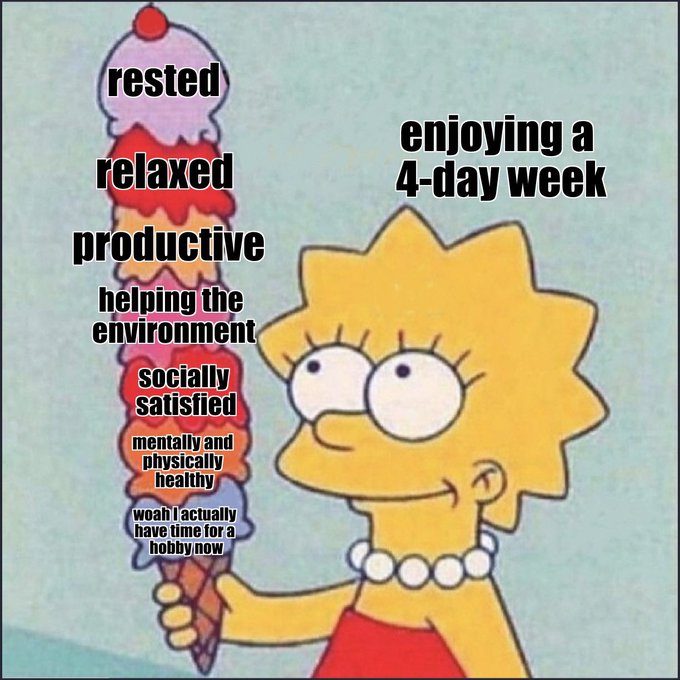When 4 Day Week Global not-for-profit organisation launched its pilot in the UK, few expected the results to be so overwhelmingly positive. Better mental health and well-being among staff, alongside significantly higher productivity, transpired during the trial across different industries. A large proportion of participating businesses went on to permanently introduce the four-day workweek. Now, most Britons assume that a shorter working week will be the norm by 2030, with only 22 per cent believing the status quo will remain.
The pilot concluded in February and was hailed as a “major breakthrough” after 56 of the 61 participating businesses indicated they would continue to operate with the short working week. For employees who received the same pay, multiple benefits materialised, including improved mental health and well-being. Companies reported higher productivity, as from the outset, employees were aware they would have the same wages but would also need to complete the same workload.
The research by the University of Cambridge and Bosten University in partnership with 4 Day Week Global and the think tank Autonomy saw nearly 3,000 employees try the four-day workweek, reporting significantly lower stress levels. Companies experienced a two-third drop in the number of sick days taken. Compared to the previous year, 57% fewer workers resigned from participating companies. They reported sleeping better and enjoying a better work-life balance, making them far less prone to burnout. Company revue rose 1.4 per cent on average during the trial and 35 per cent compared to the same six-month period in 2021.
After the results’ publication, a University of Cambridge researcher said:
“We feel really encouraged by the results, which showed the many ways companies were turning the four-day week from a dream into realistic policy, with multiple benefits.”
In the trial report’s conclusion, the authors added:
“The benefits of a shorter working week for no reduction in pay are now both well-known and well-evidenced: employees are happier and healthier, and the organisations they work for are often more productive, more efficient, and retain their staff more readily.”
Four-day workweek doesn’t work for everyone
Some drawbacks and negative feedback arose too. Employees of big corporations reported having to complete a significant number of tasks in fewer hours. The workplace reportedly grew less communicative, which creative companies considered an impediment to quality work.
Customer-facing companies experienced difficulty maintaining services and saw no option but to hire additional staff. Customer care centres who usually deal with most enquiries on Mondays and Fridays found it impossible to allow staff to take off three days in a row. Larger companies reported the four-day workweek functioning splendidly across the business except for customer service.
The four-day workweek trial involved companies from various sectors, including advertising and marketing, asset management, and insurance, alongside five NGOs/charities. Education, online retail, and healthcare companies also participated, as did a fish and chip shop. Most businesses gave staff either Friday or Monday off, with some awarding an extra day’s rest during the week to suit work schedules, meaning the extra day wasn’t universal among staff.
The trial saw companies experimenting with different models. Rather than reducing the workweek by a day, some companies shortened the workday to six hours. Professor of the future of work at Newcastle University Business School Abigail Marks said:
“Without reducing the intensity of workloads and tackling overworking more broadly, a mass scale four-day week risks intensifying already intense workloads.
“A six-hour workday may be more effective than a four-day week among organisations that are able to do so.”
Speaking to the BBC, she acknowledged “that the traditional nine-to-five isn’t working, adding, “people are realising that long hours culture isn’t healthy or sustainable.”
Survey shows two-thirds of Britons want the government to explore a four-day workweek
The Survation survey, which reported most participants expecting the shorter workweek to become ‘normal’ over the next few years, also showed that 65% want to see the government “exploring the introduction of a four-day working week, with no loss of pay for workers”. Only ten per cent spoke out against it.
But the government appears unlikely to push ahead. Speaking to The Independent, a spokesperson said:
“We have no plans to introduce a four-day working week.
“The government is entirely focused on delivering the prime minister’s priorities for people across the UK, such as growing the economy and cutting waiting lists.”
In 2018, Labour had put forward plans but now appears less keen. The Trades Union Congress (TUC) said the introduction of the four-day workweek would be the logical continuation of changes introduced in the previous two centuries.
4 Day Week Global’s campaign director, Joe Ryle, told The Independent:
“We are long overdue an update to working hours, and the British public are ready to say goodbye to the outdated 9-5, five-day working week.
“Moving the economy to a four-day week can be achieved by the end of this decade, and it would give everyone the time to be able to live much happier and more fulfilled lives.”




